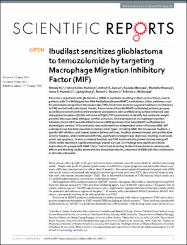| dc.contributor.author | Ha, Wendy | |
| dc.contributor.author | Sevim-Nalıiran, Hatice | |
| dc.contributor.author | Zaman, Ashraf M. | |
| dc.contributor.author | Matsuda, Kazuko | |
| dc.contributor.author | Khasraw, Mustafa | |
| dc.contributor.author | Nowak, Anna K. | |
| dc.contributor.author | Chung, Liping | |
| dc.contributor.author | Baxter, Robert C. | |
| dc.contributor.author | McDonald, Kerrie L. | |
| dc.date.accessioned | 2020-12-19T19:40:36Z | |
| dc.date.available | 2020-12-19T19:40:36Z | |
| dc.date.issued | 2019 | |
| dc.identifier.citation | Ha, W., Sevim-Nalkiran, H., Zaman, A. M., Matsuda, K., Khasraw, M., Nowak, A. K., Chung, L., Baxter, R. C., & McDonald, K. L. (2019). Ibudilast sensitizes glioblastoma to temozolomide by targeting Macrophage Migration Inhibitory Factor (MIF). Scientific reports, 9(1), 2905. https://doi.org/10.1038/s41598-019-39427-4 | en_US |
| dc.identifier.issn | 2045-2322 | |
| dc.identifier.uri | https://doi.org/10.1038/s41598-019-39427-4 | |
| dc.identifier.uri | https://hdl.handle.net/11436/1589 | |
| dc.description | Nowak, Anna K/0000-0002-9317-9526; Baxter, Robert C/0000-0001-5061-2142; Khasraw, Mustafa/0000-0003-3249-9849 | en_US |
| dc.description | WOS: 000459799800054 | en_US |
| dc.description | PubMed: 30814573 | en_US |
| dc.description.abstract | Recurrence in patients with glioblastoma (GBM) is inevitable resulting in short survival times, even in patients with O-6-Methylguanine-DNA Methyltransferase (MGMT) methylation. Other pathways must be activated to escape from temozolomide (TMZ) treatment, however acquired resistance mechanisms to TMZ are not well understood. Herein, frozen tumors from 36 MGMT methylated patients grouped according to overall survival were extracted and proteins were profiled using surface-enhanced laser desorption/ionization (SELDI) with time-of flight (TOF) proteomics to identify low molecular weight proteins that associated with poor survival outcomes. Overexpression of macrophage migration inhibitory factor (MIF) was identified in human GBM specimens that were MGMT methylated but showed poor survival. This correlation was confirmed in an independent cohort of human GBM. MIF overexpression has been reported in several cancer types, including GBM. We repurposed ibudilast, a specific MIF inhibitor, and treated patient derived cell lines. Ibudilast showed modest anti-proliferative activity however, when combined with TMZ, significant synergism was observed, resulting in cell cycle arrest and apoptosis. in vivo, combined ibudilast and TMZ treatment of a patient derived xenograft (PDX) model resulted in significantly longer overall survival. Our findings have significant clinical implications for people with GBM. Since clinical trials involving ibudilast have shown no adverse side effects and the drug readily penetrates the blood brain barrier, treatment of GBM with this combination is clinically achievable. | en_US |
| dc.description.sponsorship | Cure Brain Cancer Foundation; Olle Fund for Brain Cancer Research | en_US |
| dc.description.sponsorship | The authors would like to acknowledge funding contributions from the Cure Brain Cancer Foundation and the Olle Fund for Brain Cancer Research. We would also like to thank Dr Bryan Day (QIMR Berghofer) for the patient derived cell lines, RN1 and BAH1. | en_US |
| dc.language.iso | eng | en_US |
| dc.publisher | Nature Publishing Group | en_US |
| dc.rights | info:eu-repo/semantics/openAccess | en_US |
| dc.subject | Promoter hypermethlation | en_US |
| dc.title | Ibudilast sensitizes glioblastoma to temozolomide by targeting Macrophage Migration Inhibitory Factor (MIF) | en_US |
| dc.type | article | en_US |
| dc.contributor.department | RTEÜ, Tıp Fakültesi, Temel Tıp Bilimleri Bölümü | en_US |
| dc.contributor.institutionauthor | Sevim Nalkıran, Hatice | |
| dc.identifier.doi | 10.1038/s41598-019-39427-4 | |
| dc.identifier.volume | 9 | en_US |
| dc.ri.edit | oa | en_US |
| dc.relation.journal | Scientific Reports | en_US |
| dc.relation.publicationcategory | Makale - Uluslararası Hakemli Dergi - Kurum Öğretim Elemanı | en_US |


















